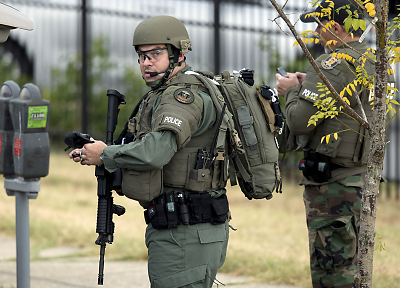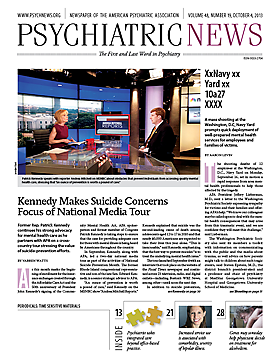The shooting deaths of 12 employees at the Washington, D.C., Navy Yard on Monday, September 16, set in motion a rapid response from area mental health professionals to help those affected by the tragedy.
APA President Jeffery Lieberman, M.D., sent a letter to the Washington Psychiatric Society expressing sympathy for victims and their families and offering APA’s help. “We know our colleagues may be called upon to deal with the mental health consequences that may arise from this traumatic event, and we are confident they will meet this challenge,” said Lieberman.
The Washington Psychiatric Society also sent its members a toolkit with information on communicating with the public and the media about trauma, as well as advice on how parents might talk to children about such tragic events, said Steven Epstein, M.D., the district branch’s president-elect and a professor and chair of psychiatry at MedStar Georgetown University Hospital and Georgetown University School of Medicine. Meanwhile, other local and federal agencies quickly organized to help those affected by the shooting. “We are working with the Mayor’s Office of Victims Services and other District of Columbia government agencies, the FBI, and the American Red Cross on longer-term services for families,” said director of the District of Columbia Department of Mental Health (DCDMH) Steve Baron, L.C.S.W., on the afternoon of the shooting. Those agencies coordinated their efforts with daily telephone conference calls over the next several days.
DCDMH sent children’s emergency response teams and school-based mental health clinicians to schools near the Navy Yard and set up an assistance center at the nearby Greenleaf Recreation Center for people in surrounding neighborhoods.
“We are offering counseling provided by our mobile crisis team, which includes social workers and paraprofessionals, supported by a psychiatrist,” said psychiatrist Elspeth Cameron Ritchie, M.D., M.P.H., chief medical officer of the DCDMH.
One team was assigned to a school that had been locked down during the shooting. They talked with staff and students, but no clinical work was performed, she said.
The department is planning outreach efforts to city schools over the next few months and will have representatives at memorial services for victims.
Meantime, the U.S. Navy’s Fleet and Family Support Program set up an emergency family assistance center (EFAC) at Joint Base Anacostia-Bolling (formerly Bolling Air Force Base), not far from the Navy Yard.
On calmer days, the program provides general support services for the military community at six centers in states around the capital region, said Robert Klebahn, M.A., regional program manager.
“But in emergencies, we grow the EFAC out of the military support center and augment it with additional personnel,” he said in an interview. “We plan and train annually, so we knew what was needed.”
Because the regional support program is based at Anacostia-Bolling, its personnel could act immediately. The shooting began shortly after 8 a.m., but by 11 that morning, they had opened a center on the base to take calls from affected families and others concerned about Navy Yard employees, he said.
Later that day, a social worker went to the police department in the Navy Yard to work with officers who had engaged the gunman.
The following morning, more social workers from Navy support centers in Maryland arrived to provide crisis counseling to callers. In addition, a Navy Special Psychiatric Rapid Intervention Team (SPRINT) based in Portsmouth, Va., set up shop inside the Navy Yard. Federal Occupational Health Services, a civilian contractor, began offering psychological first aid and crisis counseling, if needed, to civilian employees.
Eventually, Klebahn and his colleagues will determine when they might wind down the EFAC and move its employees back to their regular jobs helping military families.
That transition will be paralleled by one connecting any Navy Yard personnel needing psychosocial services with agencies or clinicians near their homes in Maryland, Virginia, or Washington. In addition, the Fleet and Family Support Centers will still be available to provide counseling to military service members and their families, said Klebahn.
The gunman, Aaron Alexis, 34, was a former Navy Reservist with a troubled personal history who worked as a computer specialist for a government subcontractor at the Navy Yard. ■

